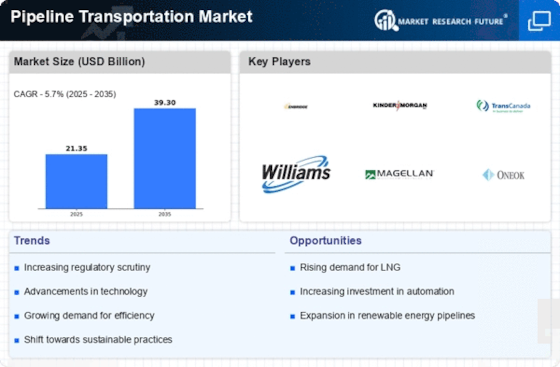Transmission Pipeline
Distribution Pipeline
Gathering Pipeline
Automation and Control
Security Solutions
Integrity and Tracking Solution
Network Communication Solution
Others
Maintenance & Support Services
Managed Services
Consulting Services
Oil & Gas
Water
Coal
Others
Pipeline Transportation Market by TypeTransmission Pipeline
Distribution Pipeline
Gathering Pipeline
Pipeline Transportation Market by SolutionAutomation and Control
Security Solutions
Integrity and Tracking Solution
Network Communication Solution
Others
Pipeline Transportation Market by ServiceMaintenance & Support Services
Managed Services
Consulting Services
Pipeline Transportation Market by ApplicationOil & Gas
Water
Coal
Others
Pipeline Transportation Market by TypeTransmission Pipeline
Distribution Pipeline
Gathering Pipeline
Pipeline Transportation Market by SolutionAutomation and Control
Security Solutions
Integrity and Tracking Solution
Network Communication Solution
Others
Pipeline Transportation Market by ServiceMaintenance & Support Services
Managed Services
Consulting Services
Pipeline Transportation Market by ApplicationOil & Gas
Water
Coal
Others
Pipeline Transportation Market by TypeTransmission Pipeline
Distribution Pipeline
Gathering Pipeline
Pipeline Transportation Market by SolutionAutomation and Control
Security Solutions
Integrity and Tracking Solution
Network Communication Solution
Others
Pipeline Transportation Market by ServiceMaintenance & Support Services
Managed Services
Consulting Services
Pipeline Transportation Market by ApplicationOil & Gas
Water
Coal
Others
Pipeline Transportation Market by TypeTransmission Pipeline
Distribution Pipeline
Gathering Pipeline
Pipeline Transportation Market by SolutionAutomation and Control
Security Solutions
Integrity and Tracking Solution
Network Communication Solution
Others
Pipeline Transportation Market by ServiceMaintenance & Support Services
Managed Services
Consulting Services
Pipeline Transportation Market by ApplicationOil & Gas
Water
Coal
Others
Germany Outlook (USD Billion, 2018-2032)
Pipeline Transportation Market by TypeTransmission Pipeline
Distribution Pipeline
Gathering Pipeline
Pipeline Transportation Market by SolutionAutomation and Control
Security Solutions
Integrity and Tracking Solution
Network Communication Solution
Others
Pipeline Transportation Market by ServiceMaintenance & Support Services
Managed Services
Consulting Services
Pipeline Transportation Market by ApplicationOil & Gas
Water
Coal
Others
Pipeline Transportation Market by TypeTransmission Pipeline
Distribution Pipeline
Gathering Pipeline
Pipeline Transportation Market by SolutionAutomation and Control
Security Solutions
Integrity and Tracking Solution
Network Communication Solution
Others
Pipeline Transportation Market by ServiceMaintenance & Support Services
Managed Services
Consulting Services
Pipeline Transportation Market by ApplicationOil & Gas
Water
Coal
Others
Pipeline Transportation Market by TypeTransmission Pipeline
Distribution Pipeline
Gathering Pipeline
Pipeline Transportation Market by SolutionAutomation and Control
Security Solutions
Integrity and Tracking Solution
Network Communication Solution
Others
Pipeline Transportation Market by ServiceMaintenance & Support Services
Managed Services
Consulting Services
Pipeline Transportation Market by ApplicationOil & Gas
Water
Coal
Others
Pipeline Transportation Market by TypeTransmission Pipeline
Distribution Pipeline
Gathering Pipeline
Pipeline Transportation Market by SolutionAutomation and Control
Security Solutions
Integrity and Tracking Solution
Network Communication Solution
Others
Pipeline Transportation Market by ServiceMaintenance & Support Services
Managed Services
Consulting Services
Pipeline Transportation Market by ApplicationOil & Gas
Water
Coal
Others
Pipeline Transportation Market by TypeTransmission Pipeline
Distribution Pipeline
Gathering Pipeline
Pipeline Transportation Market by SolutionAutomation and Control
Security Solutions
Integrity and Tracking Solution
Network Communication Solution
Others
Pipeline Transportation Market by ServiceMaintenance & Support Services
Managed Services
Consulting Services
Pipeline Transportation Market by ApplicationOil & Gas
Water
Coal
Others
Pipeline Transportation Market by TypeTransmission Pipeline
Distribution Pipeline
Gathering Pipeline
Pipeline Transportation Market by SolutionAutomation and Control
Security Solutions
Integrity and Tracking Solution
Network Communication Solution
Others
Pipeline Transportation Market by ServiceMaintenance & Support Services
Managed Services
Consulting Services
Pipeline Transportation Market by ApplicationOil & Gas
Water
Coal
Others
Pipeline Transportation Market by TypeTransmission Pipeline
Distribution Pipeline
Gathering Pipeline
Pipeline Transportation Market by SolutionAutomation and Control
Security Solutions
Integrity and Tracking Solution
Network Communication Solution
Others
Pipeline Transportation Market by ServiceMaintenance & Support Services
Managed Services
Consulting Services
Pipeline Transportation Market by ApplicationOil & Gas
Water
Coal
Others
Pipeline Transportation Market by TypeTransmission Pipeline
Distribution Pipeline
Gathering Pipeline
Pipeline Transportation Market by SolutionAutomation and Control
Security Solutions
Integrity and Tracking Solution
Network Communication Solution
Others
Pipeline Transportation Market by ServiceMaintenance & Support Services
Managed Services
Consulting Services
Pipeline Transportation Market by ApplicationOil & Gas
Water
Coal
Others
Pipeline Transportation Market by TypeTransmission Pipeline
Distribution Pipeline
Gathering Pipeline
Pipeline Transportation Market by SolutionAutomation and Control
Security Solutions
Integrity and Tracking Solution
Network Communication Solution
Others
Pipeline Transportation Market by ServiceMaintenance & Support Services
Managed Services
Consulting Services
Pipeline Transportation Market by ApplicationOil & Gas
Water
Coal
Others
Pipeline Transportation Market by TypeTransmission Pipeline
Distribution Pipeline
Gathering Pipeline
Pipeline Transportation Market by SolutionAutomation and Control
Security Solutions
Integrity and Tracking Solution
Network Communication Solution
Others
Pipeline Transportation Market by ServiceMaintenance & Support Services
Managed Services
Consulting Services
Pipeline Transportation Market by ApplicationOil & Gas
Water
Coal
Others
Pipeline Transportation Market by TypeTransmission Pipeline
Distribution Pipeline
Gathering Pipeline
Pipeline Transportation Market by SolutionAutomation and Control
Security Solutions
Integrity and Tracking Solution
Network Communication Solution
Others
Pipeline Transportation Market by ServiceMaintenance & Support Services
Managed Services
Consulting Services
Pipeline Transportation Market by ApplicationOil & Gas
Water
Coal
Others
Pipeline Transportation Market by TypeTransmission Pipeline
Distribution Pipeline
Gathering Pipeline
Pipeline Transportation Market by SolutionAutomation and Control
Security Solutions
Integrity and Tracking Solution
Network Communication Solution
Others
Pipeline Transportation Market by ServiceMaintenance & Support Services
Managed Services
Consulting Services
Pipeline Transportation Market by ApplicationOil & Gas
Water
Coal
Others
Pipeline Transportation Market by TypeTransmission Pipeline
Distribution Pipeline
Gathering Pipeline
Pipeline Transportation Market by SolutionAutomation and Control
Security Solutions
Integrity and Tracking Solution
Network Communication Solution
Others
Pipeline Transportation Market by ServiceMaintenance & Support Services
Managed Services
Consulting Services
Pipeline Transportation Market by ApplicationOil & Gas
Water
Coal
Others
Pipeline Transportation Market by TypeTransmission Pipeline
Distribution Pipeline
Gathering Pipeline
Pipeline Transportation Market by SolutionAutomation and Control
Security Solutions
Integrity and Tracking Solution
Network Communication Solution
Others
Pipeline Transportation Market by ServiceMaintenance & Support Services
Managed Services
Consulting Services
Pipeline Transportation Market by ApplicationOil & Gas
Water
Coal
Others
Pipeline Transportation Market by TypeTransmission Pipeline
Distribution Pipeline
Gathering Pipeline
Pipeline Transportation Market by SolutionAutomation and Control
Security Solutions
Integrity and Tracking Solution
Network Communication Solution
Others
Pipeline Transportation Market by ServiceMaintenance & Support Services
Managed Services
Consulting Services
Pipeline Transportation Market by ApplicationOil & Gas
Water
Coal
Others
Pipeline Transportation Market by TypeTransmission Pipeline
Distribution Pipeline
Gathering Pipeline
Pipeline Transportation Market by SolutionAutomation and Control
Security Solutions
Integrity and Tracking Solution
Network Communication Solution
Others
Pipeline Transportation Market by ServiceMaintenance & Support Services
Managed Services
Consulting Services
Pipeline Transportation Market by ApplicationOil & Gas
Water
Coal
Others


















Leave a Comment